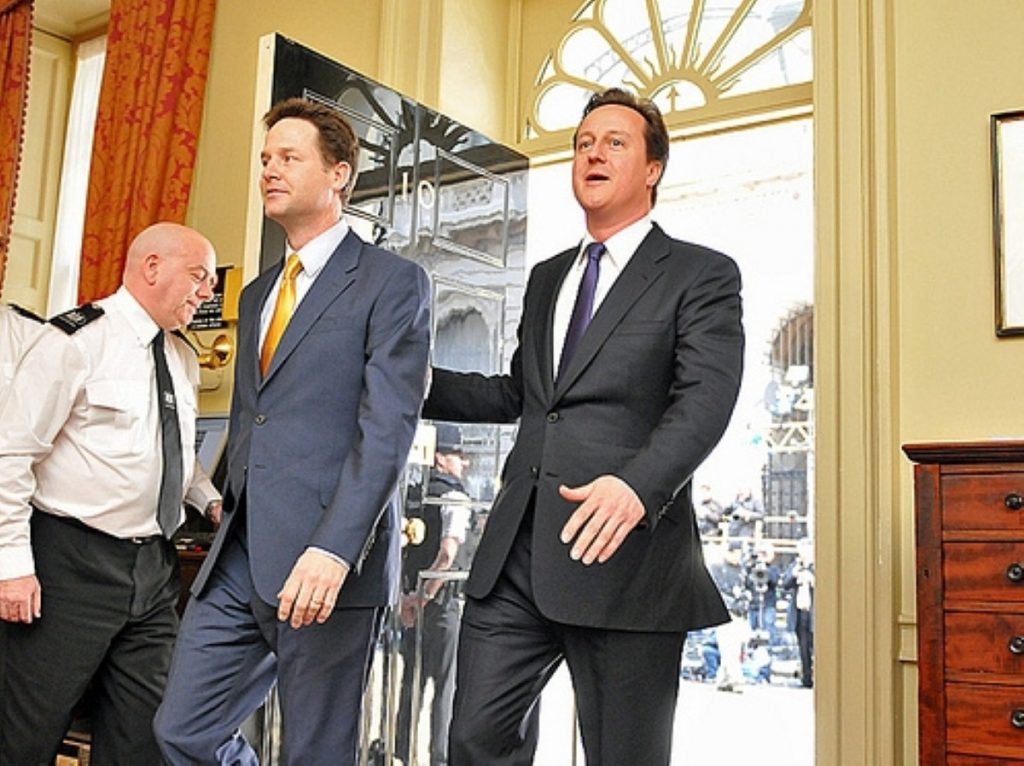Analysis: Economic misery and the 2015 election
If May 2010's hung parliament negotiations were taking place in November 2011, would Nick Clegg's party think again about entering into a coalition?
By Alex Stevenson Follow @alex__stevenson
The Liberal Democrats and Conservatives were able to agree on a bold strategy of deficit reduction during the hung parliament negotiations of May 2010 because they were confident the pain and suffering of austerity would be behind them by 2015.
Yes, it would be hard. Yes, both parties would be unpopular. But the logic went that by 2015 the recovery would be well underway – and both parties would benefit at the ballot box for having taken difficult, but ultimately courageous, decisions.


Eighteen months later, that scenario is still a possibility come May 2015. But the odds of it coming to pass have lengthened significantly.
Even if the recovery had been progressing as well as ministers might have hoped, we would still have seen the clashes over public sector pensions, tuition fees and cuts to public services – police, schools, the NHS – currently driving the government's popularity downwards.
These might be tolerable if they had taken place on their own.
But GDP is broadly stagnant and, so the Bank of England predicted today, would not begin growing meaningfully until next summer at the earliest.
On top of that, the eurozone has slipped into crisis. This increases the risk of a double-dip recession from 50% to 70%, according to the National Institute for Economic and Social Research (Niesr).
Muted growth undermines the success of the spending cuts, for the Treasury's tax receipts are lower than expected. This is not good news: the effect is combined with high unemployment sending the welfare bill spiralling upwards.
So by November 2011 it's become clear they are accompanied by deep overshadowing uncertainty caused by the stuttering recovery.
Everyone knows political success rests on economic success. The clock towards the next general election is ticking, but the situation is now looking worse, not better, than it did on that morning of optimism in Downing Street's Rose Garden.
Disaster is never far away, it seems. Visions of the chancellor desperately paddling away from a whirlpool of economic calamity seem all to easy to conjure up.
This doesn't necessarily mean that, were we working to a different electoral timetable, now would be a bad time to enter into coalition.
Were those Tory-Lib Dem talks taking place now, rather than in May 2010, the case for leading the economy out of difficulty could be made just as well.
Five years is a long time – more than enough, surely, for peril to be averted and political capital to be accumulated in the process.
So let's escape from that hypothetical – and face the facts of brutal reality. The 2010 decision might have felt like the right one at the time, but it is looking less wise now.
In 2015 the public will assess the coalition's record in government – the decisions made, the choices taken. But they will also be delivering their verdict on the state of Britain in those five years.
At least the first half of that period appears to be an unending tale of unemployment, cuts and the misery they've created.
A delayed recovery makes the chances of the public forgetting about these very tough times very much more unlikely.
The misgivings of those who wondered in 2010 whether coalition was a good idea will only be growing as a result.









